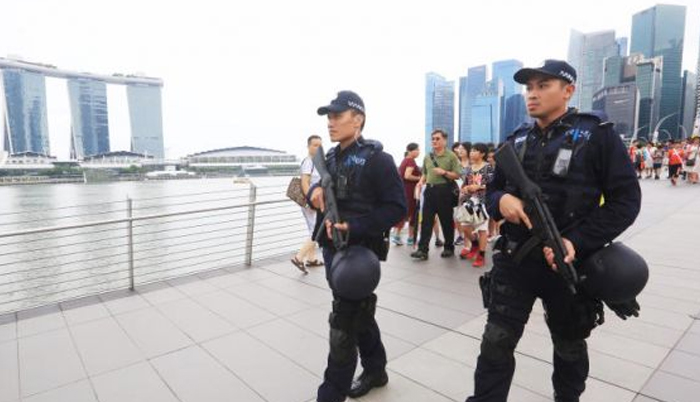![]() Home > Singapore
Home > Singapore
New Laws Up Terror Security, Bar Foreigners From Local Political Causes

The Emergency Response team’s (ERT) seen patrolling at the jubilee bridge on July 22, 2016. TODAY file photo
![]() April 4th, 2017 | 08:21 AM |
April 4th, 2017 | 08:21 AM | ![]() 1455 views
1455 views
SINGAPORE
Laws protecting the public from the growing terrorist threat and explicitly barring foreigners from using the Republic to further political agendas were passed in Parliament yesterday, with Law and Home Affairs Minister K Shanmugam stressing the Government’s longstanding position that “foreigners and foreign entities should not import foreign politics into Singapore”.
“Nor should they interfere in our domestic politics, especially those issues of a political or controversial nature,” he told the House.
Wide-ranging amendments to the Public Order Act include possibly requiring organisers of large-scale public events — deemed to be at high risk of a terror attack or public order incident — to deploy armed security officers and barricades, and conduct full-person and bag checks. Foreigners are also prohibited from using assemblies and processions in Singapore to promote political causes, by giving the Commissioner of Police powers to reject such applications, so long as he has “reasonable grounds” to believe that the event is “directed towards a political end”, and involves foreign entities and foreigners.
“The Commissioner would have to consider if such activities would cover matters, regardless of whether in Singapore or elsewhere, that promote the interests of political parties or group of persons organised for political objectives,” Mr Shanmugam explained.
Activities that are deemed as influencing, or seeking to influence policies or decisions of any government, legislative changes, any election or referendum, or public opinion on controversial issues are also included, for example. So too are events that “promote or oppose political views or public conduct relating to activities that have become the subject of political debate”, Mr Shanmugam said.
During the debate, which lasted more than one-and-a-half hours, several Members of Parliament (MPs) voiced concerns over the impact of the changes on civil society groups, including their access to foreign expertise, and their ability to pay for enhanced security measures at events. Two MPs — Nee Soon GRC MP Louis Ng and Nominated MP Kok Heng Leun — also questioned the power granted to the Commissioner of Police, with Mr Ng asking if public confidence in the police could be compromised should the men in blue be tasked with making “political decisions”.
In response, Mr Shanmugam pointed out: “He is not deciding in favour of one conclusion or another ... his is a threshold question.”
He added that most avenues for civil society groups to tap into foreign expertise and knowledge remained untouched, given that the provisions in the legislative changes relate to public assemblies and processions.
Mr Kok also asked whether the involvement of foreign employees in non-governmental organisations (NGOs) in the planning and running of events could land them in trouble with the law. Mr Shanmugam said it depended on the role played by the foreign employees.
He added: “It will not come as a surprise for you that NGOs are a favoured route for foreign agencies to channel funds … we need to be very careful.”
He cited hypothetical examples: Malaysians financing an event here to promote the imposition of Syariah Law, Americans organising an anti-lesbian, gay, bisexual and transgender (LGBT) rally here, Myanmar Buddhists protesting against the Rohingya with the Singaporean Buddhist community, or Hindus from India financing an animal welfare event here to protest against the sale of beef.
“Our Singaporeans organising protests is one thing. Foreign-financed, foreign-participated protests are a completely different ball game,” Mr Shanmugam said.
Responding to calls by the MPs to clarify what constitutes matters of public controversy, Mr Shanmugam said that definitions would be rendered useless by the complexity of these situations. “All you will end up doing is creating many alley ways, in which … you would be made a laughing stock,” he said. He reiterated that Singaporeans will not be affected by the changes, which are “directed at foreigners and foreign entities”.
“Those events, where a permit is applied for, will be assessed carefully case by case, by the police,” said Mr Shanmugam, noting that the police have previously rejected permit applications by non-Singaporeans to organise events at the Speakers’ Corner related to Malaysia’s electoral reform group Bersih.
The changes to the Act came after the Ministry of Home Affairs (MHA) had warned foreign organisations against interfering in domestic issues, in the wake of last year’s Pink Dot event. The annual LGBT event had attracted a bumper crop of sponsors including Facebook, Google and Bloomberg then, and the MHA said it would make clear that foreign entities should not “fund, sponsor or influence such events”.
In terms of enhancing security at public events, the new laws require organisers to inform the police of estimated crowd sizes above 5,000 people (for public events) or 10,000 people (for private events) at least 28 days before the event. Failure to do so would result in a maximum penalty of one year in jail and S$20,000 in fine. For major events such as marathons, concerts and year-end countdown celebrations, which could be targets for terrorists, the police will discuss security plans with event organisers and issue directions for security measures.
Source:
courtesy of TODAY
by VALERIE KOH
If you have any stories or news that you would like to share with the global online community, please feel free to share it with us by contacting us directly at [email protected]